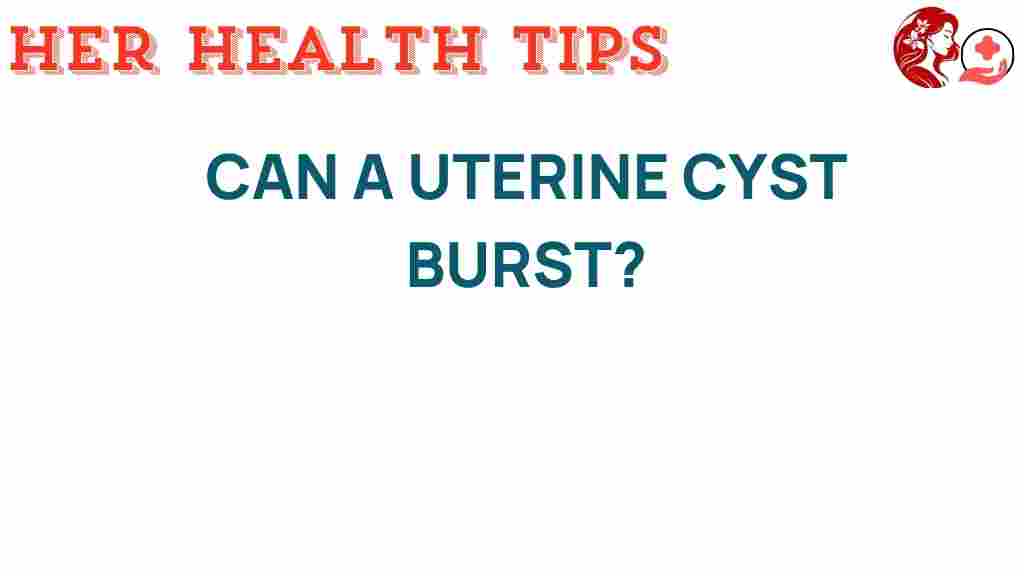Unraveling the Mystery: Can a Uterine Cyst Burst?
When it comes to women’s health, understanding uterine cysts is crucial. Uterine cysts, also known as ovarian cysts, are fluid-filled sacs that can develop on the ovaries. While many women may experience them without any symptoms, others may encounter complications that raise concerns about their health. One of the most pressing questions that arise is: can a uterine cyst burst?
Understanding Uterine Cysts
Uterine cysts are a common occurrence among women, particularly during their reproductive years. They can arise from various conditions, including hormonal imbalances, endometriosis, or even normal ovarian function. Here’s what you need to know:
- Types of Uterine Cysts: The most common types include functional cysts, dermoid cysts, and endometriomas.
- Symptoms: While many women may not experience symptoms, potential signs include pelvic pain, irregular menstrual cycles, and pressure symptoms.
- Diagnosis: A gynecologist typically diagnoses uterine cysts through pelvic exams, ultrasounds, or other imaging techniques.
Can a Uterine Cyst Burst?
Yes, a uterine cyst can burst, which is medically referred to as “rupturing.” This occurrence can lead to various symptoms and complications. Understanding what happens when a uterine cyst bursts is essential for women’s health.
Symptoms of a Bursting Uterine Cyst
When a uterine cyst bursts, it can cause sudden and severe pelvic pain. Other symptoms may include:
- Sharp pain on one side of the abdomen
- Bloating
- Nausea and vomiting
- Lightheadedness or fainting (in severe cases)
Women experiencing these symptoms should seek medical advice promptly to rule out other serious conditions.
What Causes a Uterine Cyst to Burst?
A uterine cyst can burst due to several factors, including:
- Size: Larger cysts are more likely to rupture.
- Hormonal Fluctuations: Changes in hormone levels can affect cyst stability.
- Physical Activity: Strenuous exercise or sudden movements may contribute to a cyst bursting.
Diagnosis of a Uterine Cyst
Diagnosing a uterine cyst is essential for determining the appropriate treatment. The following steps are typically involved:
- Medical History: Your doctor will take a detailed medical history to understand your symptoms and health background.
- Pelvic Exam: A physical examination may reveal any abnormalities.
- Imaging Tests: Ultrasounds or MRIs can help visualize the cyst and assess its size and type.
For more information on gynecological health, you can visit this resource.
Treatment Options for Uterine Cysts
The treatment for a uterine cyst largely depends on its size, symptoms, and whether it has ruptured. Here are common treatment options:
- Watchful Waiting: Many small cysts do not require treatment and may resolve independently.
- Medications: Hormonal contraceptives can help regulate menstrual cycles and prevent the formation of new cysts.
- Surgery: In cases of large cysts, persistent pain, or complications, surgical intervention may be necessary.
Complications of a Bursting Uterine Cyst
If a uterine cyst bursts, the primary concern is internal bleeding and infection. Complications may include:
- Hemorrhage: Severe bleeding can occur, leading to the need for immediate medical attention.
- Infection: There is a risk of infection if the cyst contents spill into the abdominal cavity.
Women experiencing severe symptoms or complications should seek emergency medical care.
Troubleshooting Tips
If you suspect you have a uterine cyst or have experienced a rupture, consider the following tips:
- Keep a Symptom Diary: Track any symptoms you experience, including pain levels and menstrual irregularities.
- Consult Your Doctor: Always seek medical advice if you notice sudden changes in your health.
- Follow-up Care: Regular check-ups with your gynecologist can help monitor any cysts and your overall health.
When to Seek Medical Advice
It is essential to know when to seek medical advice regarding uterine cysts. Consider visiting a healthcare provider if:
- You experience severe pelvic pain that does not subside.
- There are significant changes in your menstrual cycle.
- You have symptoms of infection, such as fever or unusual discharge.
Conclusion
Understanding uterine cysts is crucial for women’s health. While many women may never experience complications, knowing the signs and symptoms of a ruptured cyst can help in timely diagnosis and treatment. If you suspect you have a uterine cyst or have experienced any concerning symptoms, do not hesitate to seek medical advice. Regular check-ups with your gynecologist will ensure you stay informed and healthy. Remember, your health is paramount, and being proactive is key to managing any issues related to uterine cysts.
For more information on women’s health and gynecology, explore these resources.
This article is in the category Conditions and created by HerHealthTips Team
